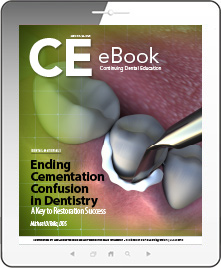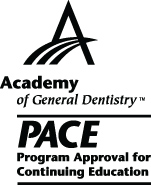CDEWorld > eBooks > Ending Cementation Confusion in Dentistry


ADA CERP is a service of the American Dental Association to assist dental professionals in identifying quality providers of continuing dental education. ADA CERP does not approve or endorse individual courses or instructors, nor does it imply acceptance of credit house by boards of dentistry. Concerns or complaints about a CE provider may be directed to the provider or to ADA CERP at www.ada.org/cerp/

Approved PACE Program Provider. FAGD/MAGD credit. Approval does not imply acceptance by a state or provincial board of dentistry, or AGD endorsement. 1/1/2023 to 12/31/2028. ID # 209722.
eBook
Released: Thursday, May 30, 2019
Expires: Tuesday, May 31, 2022
Ending Cementation Confusion in Dentistry
By Michael DiTolla, DDS
Commercial Supporter: Ivoclar Vivadent
Selecting the appropriate cement is critical to ensuring the success and longevity of a restoration. The goal of this article is to help clinicians make appropriate cementation decisions by discussing the qualities of cements and adhesives and then providing three questions to answer when considering cementation methods.
LEARNING OBJECTIVES:
-
Describe the differences between conventional cementation and adhesive bonding.
-
Describe when to use various methods of adhesive bonding or conventional cementation.
-
Explain how to disinfect and treat various monolithic restorations before either cementing or bonding them into place.
About the Author
Michael DiTolla, DDS
VP of Clinical Affairs and Communication
AEGIS Dental Network


